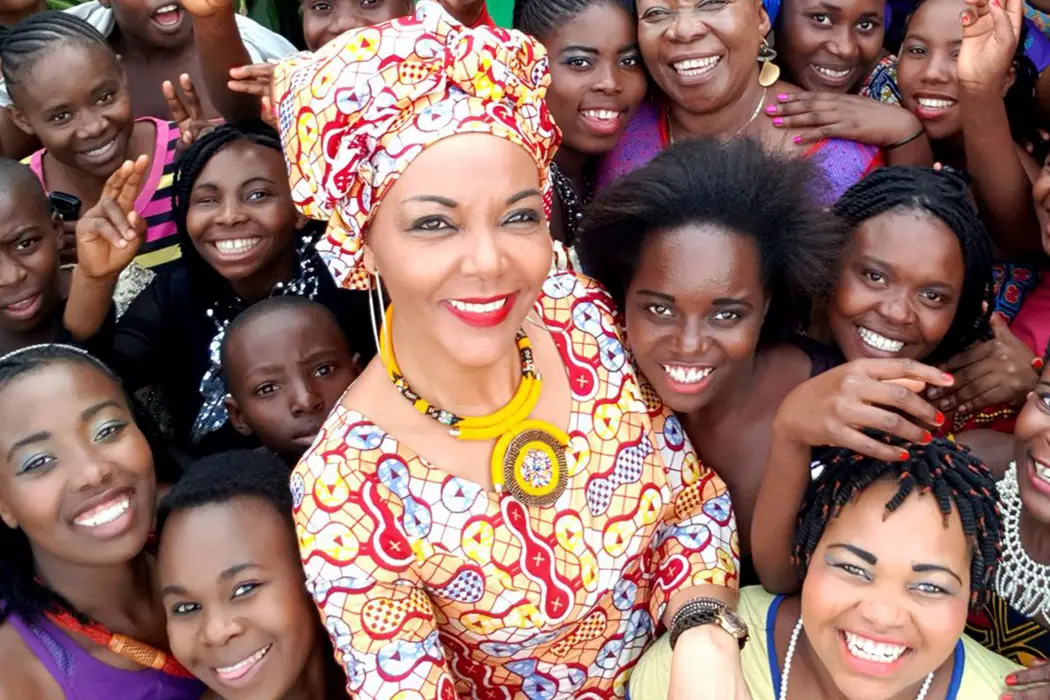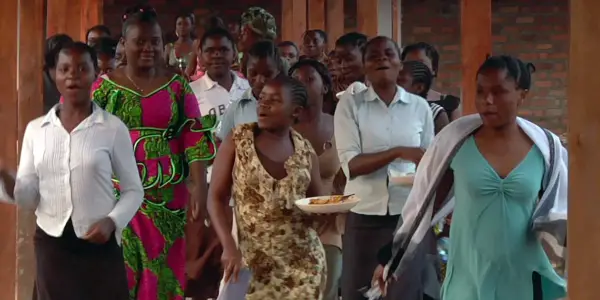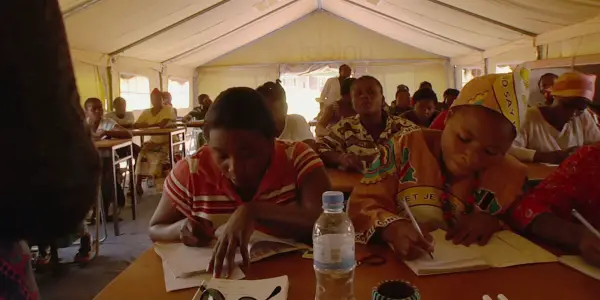CITY OF JOY: Hope For Congolese Women Lost In A Sea of War

Amyana Bartley is a screenwriter and producer. Her company, Queen…
“Violence against women impacts one out of three women on the planet. That is over one billion women and girls who will be survivors during their lifetimes. This violence destroys women, which destroys life itself, which in turn eradicates our communities and our future.” – CityofJoyCongo.com
City Of Joy, a film written and directed by Madeline Gavin, is a documentary about an organization called City of Joy, in Bukavu, East Democratic Republic of Congo, that empowers victims of violence in a region deemed “The Worst Place To Be A Woman”. With harrowing accounts from students of it’s first graduating class and it’s founders, we see, in vivid detail, some of the people that have endured unthinkable barbarism, driven by greed, misogyny and racism.
The Never-Ending War
Starting in the mid-nineties, Congo, rich in minerals like gold, diamonds and coltan, became a focus of powerful multi-national corporations.
Coltan, short for colombite-tantelites, is a mineral used to manufacture batteries for electric cars, mobile phones and tantalum capacitors. Tantalum and tantalum capacitors are a component of about every electrical device there is, from phones, printers and computers, to hearing aids, pacemakers and auto electronic components. To large electronic corporations, Congo was a literal gold mine for wealth. Due to government instability, these companies were able to hire groups of militias to take over mines all over the region.

These militias, made up of seriously poor, uneducated locals who know the forests and mines of the region, have terrorized the people in local villages surrounding the mines for over twenty years. With a well-planned strategy, the militias attack a village, rape it’s women and girls and kill their men in order to gain control of a mine for their wealthy patrons. Due to the shame surrounding rape in Congo culture, many of the women are abandoned, left with nothing but the burden of guilt and no one to help them.
On account of this terrorism, hundreds of thousands have fled the rural areas to go to cities for more protection. Abandoning their farming though, causes them great poverty, encumbering cities to feed and care for more and more refugees. Bukavu’s population alone has grown from 50,000 to now over one million. Congo’s overwhelming need for rape survivor rehabilitation set these hero’s in action.
Christine Schuler-Deschryver is a Congolese human rights advocate and co-founder of City of Joy. Growing up in Congo with a Belgian father and Congolese mother, she experienced firsthand the disturbing effects of colonization. She had witnessed the suffering it caused to her mother and other people of color. When Rwandan militias descended into Congo, she saw many children that were raped, one as young as six months old, die in her arms. She lost close friends and family in the crisis and felt compelled to help and stand up for displaced, brutalized people.
Dr Denis Mukwege, a Congolese OB/GYN and Nobel Prize nominee, was working in a rural hospital outside of Bukavu. In 1994, he witnessed Rwandan soldiers moving into his village. They destroyed the hospital he helped build and killed all of the patients in it. In 1999, he moved to Bukavu, bought two houses next to each other and established the Panzi Hospital. His first patient there was a victim of war, raped by several soldiers and then shot. At first, he thought it was an isolated incident, only to learn that rape was being used by the militias as a weapon of war. He has performed multiple surgeries to correct the internal damage of over 50,o00 women affected by gang rape. As an outspoken advocate against sexual violence and speaker at the UN, he met Eve Ensler in New York City in 2007.
Ensler, well known in the US for her controversial play The Vagina Monologues, used the success of the play and her outreach to survivors of sexual violence all over the world and created V-Day. V-Day stands today as a global leader fighting to “end harassment, rape, battery, incest, female genital mutilation and sex slavery”.
In 2011, Schuler-Deschryver, Mukwege and Ensler created the City of Joy in Bukavu.
Empowering a Community Through Its Women
“When women first come they cannot see you, they can’t talk to you, they are ashamed, they are fearful, but after six months at City of Joy they can stand, talk without fear, without shame, and they have confidence in themselves.”- Francine Bintu-Logistics Manager at City of Joy
City of Joy was established because of Congo’s devastating need for a safe haven for women who have experienced sexual violence.

The film chronicles the first class of women to go through the program at City of Joy. Through job training, self-defense classes, education on sexual violence law, therapy and self-esteem building, women who were once victims of war learn to become leaders in their own communities. They are taught to embrace and love their bodies; are encouraged to take space and use their voices to spread awareness. In six months time, a class of about 90 victimized women train to become empowered activists. Many go on to higher education and professional occupations.
Jane, one of the featured first classmates, didn’t even know the concept of rape before she was a victim of horrifying rape and violence. Impregnated by an attack, when she finally delivered her child, it had died inside her. Left to literally rot from the inside by her attackers, she was ultimately transported to the Panzi hospital in Bukavu, with a broken pelvis and a serious internal infection. After years at Panzi hospital and countless surgeries, she enrolled at City of Joy. Through the training there, she is now a social worker and full-time staffer at City of Joy.
City of Joy has transformed the lives of over 1100 women since opening in 2011. They are proof that when we invest in people, great things can happen.
The Racism That Keeps This War Going
Rape as a weapon of war is nothing new. The Bosnian War estimated that anywhere from 12,000-20,000 women were raped over its time. In Congo, the war for conflict minerals has been happening for over 20 years. Millions of people have died and hundreds of thousands of women have been raped. It’s not difficult to figure out why a war in Europe would be ended fairly quickly, but not one in Africa. Congo’s genocide hasn’t been front and center in world news because black and brown people in our world aren’t considered important. Black women are seen as even less important.

Couple the inherent colonialism that still permeates our world today, with the absolutism of the one percent that rules our societies and it’s no wonder no one is stopping the conflict in Congo. Money always matters more than lives. Gavin integrates this issue into the film, through the interviews with the founders and survivors. She also calls out, front and center, some of the companies responsible for using conflict minerals, such as Sony, Samsung, Sharp and IBM. As consumers, it is our duty to reject products that aren’t made ethically. But it’s hard to know what day to day products are involved in these conflicts.
City of Joy: Conclusion
Which is why films like these are so important.
With an unapologetic, feminine roar, City Of Joy takes on a wholly ignored genocide, racism, toxic masculinity and bloodthirsty, criminal greed. It is a rallying cry for survivors of violence and product consumers. Exposing genocide like the one in Congo gives us the information we need as consumers to fight these companies where it hurts them the most; their pockets.
If we collectively demand that our products not be made for slave wages; at the cost of millions of people’s lives and be made ethically with natural ingredients, instead of processed chemicals, we can transform entire industries. If money and racism keep these wars going, taking away the money takes away the power that sustains them. No life is worth a cell phone or computer.
We must be diligent. Greedy corporations have proven time and time again that they can’t be trusted to run themselves ethically. We must demand transparency from large corporations and refuse to literally invest in slavery, rape and murder.
We can’t afford to keep turning a blind eye with so many lives at stake.
How far are you willing to go to stop the deaths of millions? tell us your thoughts in the comments below!
City of Joy is available to stream on Netflix.
Does content like this matter to you?
Become a Member and support film journalism. Unlock access to all of Film Inquiry`s great articles. Join a community of like-minded readers who are passionate about cinema - get access to our private members Network, give back to independent filmmakers, and more.
Amyana Bartley is a screenwriter and producer. Her company, Queen B. Productions, supports filmmakers of all walks, interested in creating thought provoking, moving projects. As her company grows, she will create "real jobs" for any talented artist, in front of and behind the screen, who is passionate about making a difference using the art of film.













